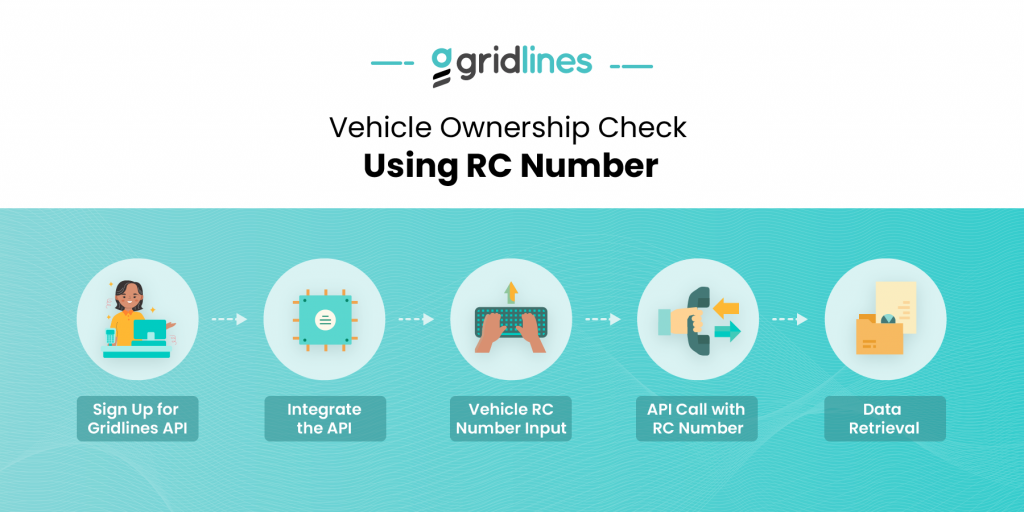Ever come across a car with a dented bumper and wondered who the owner might be? Or maybe you’re in the market for a used vehicle and want to verify its registration details. Whether you’re buying a used car, verifying details for insurance purposes, or simply curious about a vehicle’s history. Whatever the reason, knowing how to perform a vehicle ownership check can be incredibly useful.
This article dives into the world of vehicle registration and explores the Vehicle RC Verification APIs to efficiently retrieve vehicle owner details by just using the Vehicle Registration Certificate (RC) number.
Understanding Vehicle Registration Certificates (RC)
The RC serves as official proof of vehicle ownership and registration. It contains critical information about the vehicle, making it indispensable for legal and administrative purposes. Here are the key components of an RC:
- Vehicle Details:
- Make, model, color, engine number, chassis number, and fuel type.
- These particulars uniquely identify and categorize the registered vehicle.
- Owner Information:
- Name, address, and other relevant details of the registered owner.
- This information establishes legal ownership.
- Registration Number:
- A distinctive identifier assigned by the relevant transport authority.
- Validity Period:
- Indicates when the vehicle’s registration requires renewal.
- Vehicle Class and Category:
- Specifies whether the vehicle is private or commercial and its purpose of use.
Why Check Vehicle Ownership?
When it comes to vehicles, verifying ownership is essential for various reasons. Whether you’re buying a used car, dealing with accidents, or ensuring public safety, understanding vehicle ownership details is crucial. Let’s explore some key reasons why you might want to check vehicle ownership:
When it comes to vehicles, verifying ownership is essential for various reasons. Whether you’re buying a used car, dealing with accidents, or ensuring public safety, understanding vehicle ownership details is crucial. Let’s explore some key reasons why you might want to check vehicle ownership:
- Used Car Purchase:
- Before finalizing a used car deal, it’s crucial to confirm the vehicle’s ownership and registration details.
- This step helps ensure that the seller is the legitimate owner and that the car isn’t stolen
- By checking ownership records, you can avoid potential scams and make an informed decision.
- Traceability:
- Knowing the car’s owner becomes vital for reporting purposes.
- With accurate ownership information, authorities can track down the responsible party and take appropriate action.
- Processing Insurance Claims:
- In case of accidents or damage to your vehicle, valid insurance claims depend on accurate ownership details.
- Insurance companies can verify insurance details alongwith ownership records to assess liability and process claims efficiently.
- Incorrect ownership information can lead to claim delays or denials.
- Emergency Responses and Public Safety:
- During emergencies, such as accidents, medical crises, or natural disasters, knowing the vehicle owner can expedite rescue efforts.
- Accurate ownership data contributes to overall public safety and efficient emergency services.
- Ownership check usage for various industries:
- For logistics and transportation companies, verifying vehicle ownership is essential for ensuring regulatory compliance and operational efficiency.
- Ride aggregators, delivery platforms, rental services, and fleet management companies rely on accurate ownership information to manage their vehicles effectively.
- Vehicle Leasing and Contract Logistics companies verify ownership details before leasing vehicles. It ensures that the lessor has legal rights to lease the vehicle.
Ways to access Vehicle Owner Details
Accessing vehicle details through the Parivahan Website
Traditionally, people have relied on the Parivahan website, a government portal in India, to retrieve vehicle ownership details using the RC number. This method involves creating an account and navigating through the website. There might also be limitations on the frequency of checks allowed.
Steps involved are :
- Visit the Parivahan official website.
- Scroll down to the “Vehicle Related Services” section and select “Vehicle Registration.”
- Choose your state and provide the required information.
- Click on the “Vehicle Registration Number” icon.
- If the registration number is valid and in the Parivahan database, relevant owner information will be displayed.
There are other avenues as well, like third-party websites and mobile applications. However, these platforms might require subscriptions or come with limitations on the type of information accessible.
Accessing Vehicle details with Gridlines’ Vehicle RC Verification API

- Gridlineses offers the Vehicle RC Verification API that allows you to retrieve all the above vehicle information in just one click using the vehicle registration(RC) number.
- Developers, businesses, and organizations can use this API to verify and retrieve detailed RC information using the unique RC number.
- Features include real-time verification, insurance provider details, fuel type, police challans, and more.
Gridlines API offers a more efficient and convenient way to retrieve vehicle ownership details. Here’s how it works:
- Sign Up for Gridlines API: Register for a Gridlines API account and obtain an API key.
- Integrate the API: Integrate the Gridlines API into your application or website using their user-friendly documentation.
- Vehicle RC Number Input: Allow users to enter the vehicle’s RC number on your platform.
- API Call with RC Number: With the user-provided RC number and your API key, make a call to the Gridlines API.
- Data Retrieval: The API retrieves and returns comprehensive vehicle information, including the owner’s name and address (subject to data availability and privacy regulations).
Conclusion
Retrieving vehicle owner details using the registration number is a straightforward process. Whether you choose the Parivahan website or explore other APIs, having accurate information about a vehicle’s history and ownership is essential for various purposes. Remember to use reliable sources and comply with legal requirements when accessing RC details.
1. What is a vehicle ownership check?
A vehicle ownership check helps verify the legal owner of a vehicle using its registration number. It retrieves key information from official transport databases.
2. Why is checking vehicle ownership important?
It ensures that the person selling, insuring, or using the vehicle is the legitimate owner—helping prevent fraud, theft, and legal disputes.
3. What details can I get from a vehicle registration number?
You can typically fetch details like the owner’s name, registration date, vehicle class, fuel type, chassis and engine number (partially masked), and registration authority.
4. Who can use vehicle ownership verification services?
Businesses like insurers, lenders, second-hand vehicle marketplaces, fleet operators, and even law enforcement can use it for due diligence and compliance.
5. Is the information retrieved in real-time?
Yes, most vehicle ownership APIs fetch data in real-time from government transport databases like Vahan for instant verification.





Leave a Reply